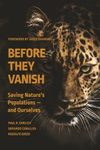By: Michael L Morrison(Editor), Leonard A Brennan(Editor), Bruce G Marcot(Editor), William M Block(Editor), Kevin S McKelvey(Editor)
191 pages, 6 b/w photos, 31 b/w illustrations, 12 b/w maps
Putting animal behaviour first, Foundations for Advancing Animal Ecology examines how studying it can advance both the field of animal ecology and strengthen conservation efforts.
![Foundations for Advancing Animal Ecology Foundations for Advancing Animal Ecology]()
Click to have a closer look
About this book
Contents
Customer reviews
Biography
Related titles
Recommended titles
About this book
How can we maximize the probability that a species of wild animal will persist into the future? This audacious book proposes that advancing animal ecology – and conservation itself – demands that we re-envision our basic understanding of how animals interact with their environments and with each other.
Synthesizing where we are and where we need to go with our studies of animals and their environs, Foundations for Advancing Animal Ecology asserts that studies of animal ecology should begin with a focus on the behaviours and characteristics of individual organisms. The book examines
- the limitations of classic approaches to the study of animal ecology
- how organisms organize into collections, such as breeding pairs, flocks, and herds
- how the broader biotic and abiotic environment shapes animal populations, communities, and ecosystems
- factors underlying the distribution and abundance of species through space and time
- the links between habitat and population
- why communication between researchers and managers is key
- specific strategies for managing wild animal populations and habitats in an evolutionary and ecosystem context
Throughout, the authors stress the importance of speaking a common and well-defined language. Avoiding vague and misleading terminology, they argue, will help ecologists translate science into meaningful and lasting actions in the environment. Taking the perspective of the organism of interest in developing concepts and applications, the authors always keep the potentially biased human perspective in focus.
A major advancement in understanding the factors underlying wildlife-habitat relationships, Foundations for Advancing Animal Ecology will be an invaluable resource to professionals and practitioners in natural resource management in public and private sectors, including state and federal agencies, non-governmental organizations, and environmental consultants.
Contents
Preface
1. Operating Concepts for Animal Ecology
2. The Study of Habitat: A Historical and Philosophical Perspective
3. Heterogeneity and Disturbance
4. The Evolutionary Perspective: Linking Habitat to Population
5. Species Occurrence in Time and Space: Synthesis and advancement
6. Managing Wild Animal Populations and Habitats in an Evolutionary and Ecosystem Context
7. Putting Concepts into Practice: Guidelines for developing study plans
Customer Reviews
Biography
Michael L. Morrison (Bishop, CA) is a professor and the Caesar Kleberg Chair in the Department of Rangeland, Wildlife, and Fisheries Management at Texas A&M University. He is the coauthor of Ornithology: Foundation, Analysis, and Application. Leonard A. Brennan (Kingsville, TX) is a research scientist and the C. C. Winn Endowed Chair for Quail Research Professor at the Caesar Kleberg Wildlife Research Institute, Texas A&M University–Kingsville. He is the coeditor of Quantitative Analyses in Wildlife Science. Bruce G. Marcot (Portland, OR) is a research wildlife biologist with the USDA Forest Service, Pacific Northwest Research Station, and the coauthor of Wildlife-Habitat Relationships: Concepts and Applications. William M. Block (Flagstaff, AZ) is scientist emeritus with the USDA Forest Service, Rocky Mountain Research Station. He is the coauthor of Wildlife Study Design. Kevin S. McKelvey (Missoula, MT) is a research ecologist with the USDA Forest Service, Rocky Mountain Research Station. He is the coauthor of Ecology and Conservation of Lynx in the United States.
By: Michael L Morrison(Editor), Leonard A Brennan(Editor), Bruce G Marcot(Editor), William M Block(Editor), Kevin S McKelvey(Editor)
191 pages, 6 b/w photos, 31 b/w illustrations, 12 b/w maps
Putting animal behaviour first, Foundations for Advancing Animal Ecology examines how studying it can advance both the field of animal ecology and strengthen conservation efforts.
"Considering the behaviors and characteristics of individual organisms as a foundation, this book encourages readers to be critical of wildlife studies and our approach to understanding the ecology and habitat of the animals we manage. This is a critically important learning objective for students in wildlife ecology and conservation."
– Serra J. Hoagland, Rocky Mountain Research Station, USDA Forest Service
"The authors' approach of identifying interacting individual animals is original and arguably necessary to gather meaningful results that will inform land management practices compatible with species persistence. This approach provides a new paradigm for study design in research on wildlife-habitat relationships."
– Victoria A. Saab, Bozeman Forestry Sciences Laboratory, USDA Forest Service








































